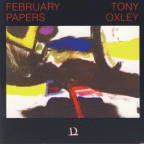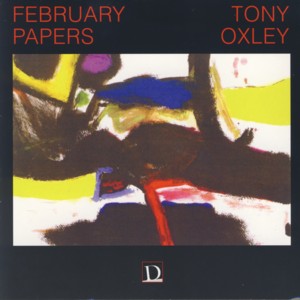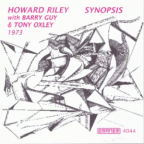Record Reviews
2 Reviews Found. Use search to find more reviews or follow the links in the review text.
  | TONY OXLEY ~ FEBRUARY PAPERS
DISCUS 099 (Barcode: 5051078983028) ~ UK ~ Avant-Garde Jazz
Recorded: 1977 Released: 2020
This is a reissue, first time on CD, of an iconic album by British Jazz drummer / composer / bandleader Tony OxleyFind albums by this artist. The album presents seven original compositions by Oxley, recorded by three lineups: a quartet with violinists Philipp WachsmannFind albums by this artist and David BourneFind albums by this artist and bassist Barry GuyFind albums by this artist (two tracks), a trio with Wachsmann and guitarist Ian BrightonFind albums by this artist (two tracks) and finally solo percussion and electronics (three tracks).
Oxley held a pivotal position in British Jazz since the mid 1960s, when he became the house drummer at Ronnie Scott´s club in London, which gave him an opportunity to play with the visiting prominent American Jazz stars and top British Jazz musicians. He was highly respected and always considered as truly extraordinary player, with his own perception of the role of drums within the Jazz idiom, but more importantly the concept of Jazz itself and its transformation into Improvised Music, which was developing at the time. Hearing Oxley performing live was for me always an extraordinary experience, regardless of the circumstances. Even within a most "straightforward" mainstream environment, his drumming was always on a different conceptual plane, although he managed to "keep time" perfectly and without a hitch.
Since the late 1960s Oxley started to be featured on a long series of revolutionary British Jazz albums recorded at the time, many of which remain as absolutely essential examples of modern British Jazz and serve as unsurpassed achievements of that boisterous creative period, like those recorded with Gordon BeckFind albums by this artist, Howard RileyFind albums by this artist, Alan SkidmoreFind albums by this artist, John McLaughlinFind albums by this artist, John SurmanFind albums by this artist, Michael GibbsFind albums by this artist and others.
His recording career as a leader started in 1969 with the release of two albums for CBSFind albums on this label: "The Baptised TravellerFind albums with this title" (1969) and "4 Compositions For SextetFind albums with this title" (1970), which in retrospect are considered as absolute gems of British Jazz discography. Those were followed by the album "IchnosFind albums with this title" (1971) released on RCAFind albums on this label. Following the disappointment with the major labels, which showed no interest in promoting these albums, Oxley joined guitarist Derek BaileyFind albums by this artist and saxophonist Evan ParkerFind albums by this artist as co-founder of the IncusFind albums on this label label, which was one of the first independent artist owned labels in Britain. He recorded two albums for the label: the eponymous "Tony OxleyFind albums with this title" (1975) and finally this, his fifth album as a leader "February PapersFind albums with this title" (1977).
The music on this album has nothing to do with Jazz in the conventional meaning of the idiom, but it is a perfectly logical continuation of the musical development that is documented on the four a.m. albums. Oxley breaks the conventional barriers and pushes the envelope towards Avant-Garde, which calls for new forms of expression not related to melody, harmony or even the usual sound expected from the instruments. Such extensive use of electronics was almost completely unheard of at the time of course and although early Improvised Music was already present on the scene, it was rarely as uncompromising and far-fetched as what Oxley decided to capture herein. Although bold spirited, the music offers a delicate, almost intimate sound and allows the listener to absorb every nuance of these performances.
The solo percussion / electronics pieces are of course the most surprising ones here. Improvised music is usually about group improvisation, but Oxley is one of the first improvisers to undertake the daring effort to freely improvise on his own, proving that such form of expression is both possible and valid.
Listening to this album today, with over four decades of perspective, enables me to extend my appreciation of this momentous historic effort from a new angle. Improvised Music is of course alive and kicking today and I am constantly exposed to a huge number of such recordings. I have to say that most of those contemporary efforts sound pretty pale in comparison to what Oxley managed to capture for posterity then. Despite the limited possibilities, surely compared to what is available today as far as electronic devices are concerned, his imagination and creativity remains unchallenged.
Kudos to Martin ArcherFind albums by this artist, the man behind DiscusFind albums on this label Records, for bringing this piece of musical history back to circulation – much appreciated! For Avant-Garde / Improvised Music enthusiasts, this is a Holy Grail!
| | Updated: 02/01/2021Posted: 03/10/2020 | CD 1 Digisleeve Remastered Recommend To A Friend |
  | HOWARD RILEY ~ SYNOPSIS
EMANEM 4044 (Barcode: 5030243404421) ~ UK ~ Free Jazz / Improvised Music
Recorded: 1973 Released: 2000
This is a reissue of the 5th album by British pianist / composer Howard RileyFind albums by this artist, recorded in a trio format with bassist Barry GuyFind albums by this artist and drummer Tony OxleyFind albums by this artist. The album was originally released on the IncusFind albums on this label label, and this reissue presents the entire session with five tracks, as opposed to the original four tracks album. All the music was composed by Riley.
By the time this album was recorded, Riley was already recognized as one of the core members of the young British Avant-Garde, which took the scene by a storm, often vehemently opposed by the British Jazz “establishment”, which included traditional / mainstream musicians and most of the Jazz press. But of course the new music was hardly bothered by anybody’s opinion and exploded rapidly, defining a new Jazz aesthetic, inspired, but completely independent from the American Free Jazz scene, and effectively much closer conceptually to what was happening in Europe at the time on both sides of the Iron Curtain.
Spearheaded both by musicians and activist (i.e. club owners, small independent record labels and “radical” journalist), the British Jazz Avant-Garde in the 1970s wrote one of the most glorious chapters in the history of British Jazz, and this album is one of numerous examples of what was happening then, and the three musicians taking part in this recording are key figures of that movement; Riley with his trios, Guy with his London Jazz Composers OrchestraFind albums by this artist and Oxley with his quintets an sextets. The collection of the albums recorded by these musicians alone, recorded between late 1960s and mid-1970s is an overwhelming body of exceptional, revolutionary and often prophetic music.
Overall, this is a brilliant example of the British Free Jazz / Improvised Music classic period, which lost nothing of its power and striking, innovative out-of-the-box thinking, which became in time an archetypal specimen of the genre. For British Jazz lovers, who include the Avant-Garde milieu in their favorite pleasures, this is an absolute must of course.
| | Updated: 17/12/2024Posted: 17/12/2024 | CD 1 Bonus Tracks Recommend To A Friend |
|







